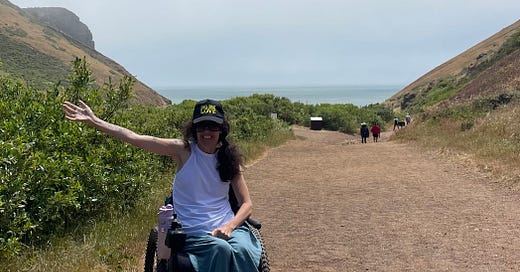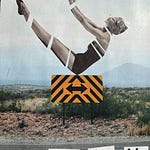Struggle: the part of my disability I wish people understood. It’s not something I’m vocal about because when I name it, it amplifies; worries those around me; and gets in the way of life. I also, tend not to discuss because I don’t want to hear stories someone’s aunt/co-worker/neighbor who has multiple sclerosis and is doing this, that and the other that I really should try.
I was diagnosed with relapse remitting MS at 28 and had an episode approximately every two years for 15-years. Each episode chipped away at my able-body so by the time I hit the 15-year mark at 43, my disease had advanced to secondary progressive MS. Around that time my walking was becoming more and more difficult due to chronic spasticity and stiffness, drop foot and loss of balance. I became completely paralyzed (non-weight bearing) at 47 and partially quadriplegic three years later. For those of you familiar with the EDSS, I’m at a 9.0 although I’m not confined to bed. I do spend a good chunk of time there, however, but I get out of the house with assistance once or twice a week. I have full-time care, and yes, please trust me when I say, I’ve done all the things (DMTs, stem cell therapy, diets etc.)...
I’m 51 now and at a stage of my disease where Struggle is no longer the annoying visitor. Now, Struggle resides with me. It fills the room and allows glimpses of light to appear only occasionally. Struggle takes the shape of a myriad of forms in pain and discomfort, anxiety and fear, tiredness and fatigue, and in things most people don’t even think about like being able to brush their hair or do a zipper up.
Before I was paralyzed I was lucky enough not to experience much pain with my MS, but now it rarely takes a break. Struggle shows up as neuropathy, muscle spasms, nausea, and head aches. I was raised in England where aromatherapy and medicinal herbs were the norm (think Peter Rabbit drinking chamomile tea for his tummy ache) and moved to Northern California in my 20s where I learned as much as anyone about Eastern and alternative medicines. But some pain is as constant as the coming and going of tides even with everything on hand.
I’m a risk-taker by nature, and anxiety hadn’t been part of my world until Struggle got wind of it. It weaseled its way into my psyche and wrapped itself around my lungs and belly ready to squeeze at the mere suggestion of going somewhere new or crowded. A favorite time for Struggle to strike is when I’m resting in bed, while my carer has popped to the shop. Already present in my burning or icy feet, and my inability to get comfortable due to a lack of fat on my bum and twisted, unaligned hips, Struggle, knowing full-well I’m unable to get out of bed on my own hisses: “What if the house catches fire? You’ll burn to death.”
During this last year, my arms and hands have been edging towards paralysis. My wrists are weak, fingers stiff and I’m lacking strength in my arms. They’re going through the same process my legs and feet went through when I was losing the ability to walk: imbalance, weakness, stiffness, needing to concentrate 100% on picking up my foot, placing it down and repeating. When I walked and talked I’d fall. Now, I’ve lost fine motor skills so can no longer write or cut up food, and when I’m fatigued or cold my fingers lock and curl into an impenetrable claw. As well as residing in my present, Struggle is showing me my future.
Struggle: the part of my disability I wish people understood. It’s not something I’m vocal about because when I name it, it amplifies; worries those around me; and gets in the way of life.













Share this post